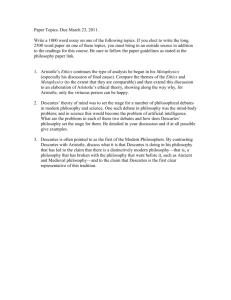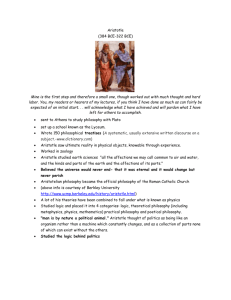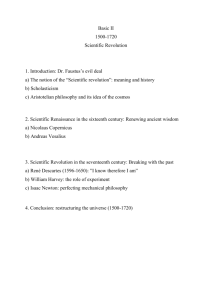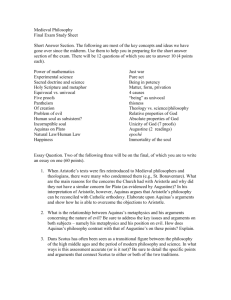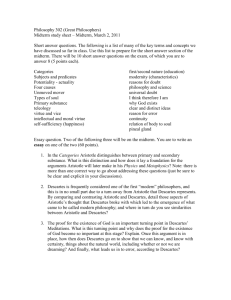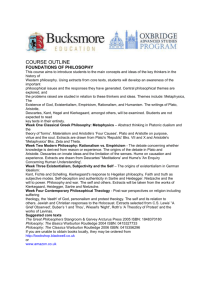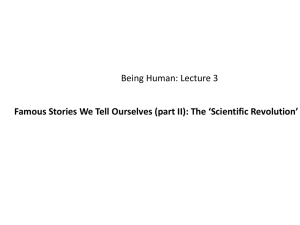Slide - University of Warwick
advertisement
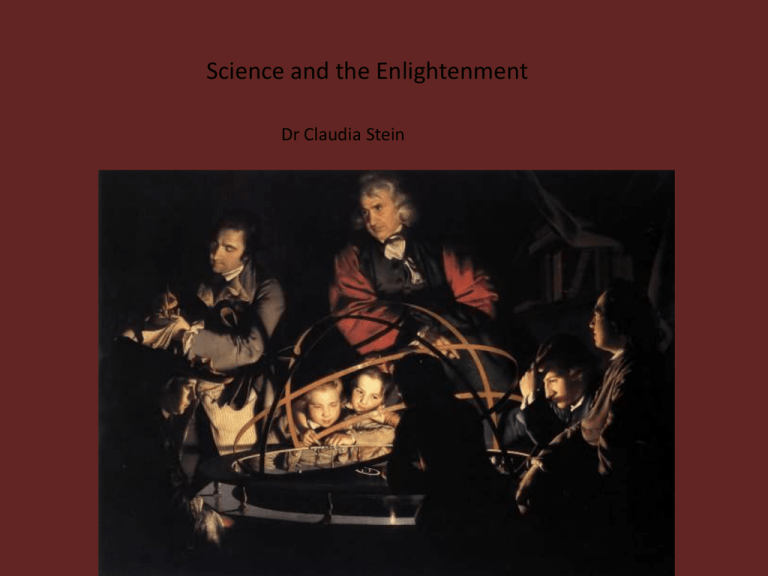
Science and the Enlightenment Dr Claudia Stein Galilei Galilei defending himself at his trial in 1633 Assumptions about ‘science’ today: • ‘science’ = natural science • Production of science through the empirical method • The value of scientific results: objective and neutral • Scientific knowledge is more truthful knowledge than knowledge produced, for example, in the humanities Practical consequences of such assumptions/beliefs Science or ‘scientia’: The word ‘science’ or lat. scientia, in its original sense means a body of systematic or orderly thinking about a determinate subject-matter. Therefore, history, theology, music, biology, physics etc. are all ‘sciences’ – and still are considered ‘sciences’ in most of the European languages (NOT in English though) The ‘Lunar Society’ at Birmingham Members: Matthew Boulton, Erasmus Darwin, Josiah Wedgwood, Joseph Priestley, and many others Natural Philosophy: refers to systematic knowledge of all aspects of the physical world, including living things. The early modern period routinely understood the physical world as God’s creations. Thus, natural philosophy concerns itself with God’s world and is linked to theology. 7 ‘I suspect I might be one of the most curious entrepreneurs alive today, in that most entrepreneurs just specialize in one area, because I keep on - you know, I'll fly in America on - have done for many years on dirty, horrible, big American carriers, and my curiosity drives me to think I can do better. "Let's set up Virgin America." Somebody tells me that 80 per cent of the species in the ocean have not been discovered, so I think, well, maybe we should try to build a submarine to go down to the bottom of the oceans and explore them… I love learning, and I just find that my general motto in life - "Screw it, just do it" - is great fun. Sometimes we fall flat on our face. Sometimes we succeed. But I'm learning all the time because I'm a curious person.’ Sir Richard Branson, the most curious man on earth (according to google) Parable of the prodigal son, Luke 15 curiosity let the younger son to sin against his father Francis Bacon, 1561 – 1626) Lord Chancellor Allegedly he died due to experimentation with a frozen chicken to understand food preservation (!) The Advancement of Learning (1605) The Great Instauration (1620) Novum Organum (1620) New Atlantis (1627) Sylva Sylvarum, or Natural History (1627) ‘So as what so ever is not God but parcel of the world, he hath fitted it for the comprehension of man's mind, if man will open and dilate the powers of understanding as he may. But yet evermore it must be remembered that the least part of the knowledge passed to man by this so large a charter from God must be subject to that use for which God hath granted it; which is the benefit and relief of the state and society of man; for otherwise all manner of knowledge becometh malign and serpentine, and therefore as carrying the quality of the serpent's sting and malice it maketh the mind of man to swell; ast he Scripture saith excellently: knowledge bloweth up, but charity buildeth up.’ ‘…that they consider what are the true ends of knowledge, and that they seek it not either for pleasure of the mind, or for contention or for superiority to others, or for profit, or fame, or power, or any of these inferior things; but for the benefit and use of life; and that they perfect and govern it in charity.’ Empiricism: a philosophical stance that holds that all knowledge is rooted in the senses and the experience that they provide Bacon is often called the ‘father’ of empiricism Some of his writings: On the heavens On sleep and sleeplessness On animals On the soul Virtues and vices Meteorology Metaphysics On Longlivity and Shortness of Life Poetics Generation and Corruption And many, many more … Aristotle, 384 BC – 322 BC Scholasticism; scholastic: Scholasticism is a term applied to the intellectual and academic style of the medieval universities, a style stressing debate, disputation, and the effective use of cannonical texts (such as those of Aristotle) in the making of arguments. A ‘scholastic’ is a practitioner of that style of thinking. Syllogism: the central technical device in formal logic in the universities of the Middle Ages and early modern period, derived from Aristotle’s writings on logic, and consisting of a ‘major premises’ (all As are B), a ‘minor premise’ (C is A), And a ‘conclusion’ (therefore C is B) Example: All men are mortal Socrates is a man Therefore Socrates is mortal See for all this: Peter Dear, Revolutionizing the Sciences: European Knowledge and Its Ambition (2001,2009) What did scholastic natural philosophers do? • Collecting and cataloguing the wonders of God’s creation – all the things we have forgotten due to the fall • To explain why things were the way they were; they were not about ‘discovery’ But about the question. Why did God make things the way they are? The method is ‘deductive’ – it moves from what is known as universally true to why a natural thing behaves in the way it does Bacon wished to changes this system of thinking and suggested his empirical method (inductive). We move from individual sense experience to universal claims. Philosophiæ Naturalis Principia Mathematica ("Mathematical Principles of Natural Philosophy" first published in 1687, laid the foundations for classical mechanics. Nature proceeds according to laws Newton-mania in the 18th century Experimentation and mathematics become Foundations for the investigations of science Experimentation as a popular pursuit Isaac Newton, 1642-1727) Mesmermism: a theory which assumed a natural energetic transference that occurred between all animated and inanimate objects, so-called animal magnetism. His theory attracted a wide following between about 1780 and 1850 all over Europe. Franz Anton Mesmer, 1743-1815 Essay Concerning Human Understanding (1690; 1694) presents a new idea about human nature and the self which becomes the basis for theories abou thinking about self and mind during the 18th centu Based on Thomas Hobbes and his ideas on human reasoning in Leviathan (1651) – Presents idea that sense perception is key to understanding human behavior John Locke 1632-1704, Central claim: Mind is a ‘blank slate’ at birth; thus a persons character, his or her self, is not innate but ‘made’ throughout life due to ongoing sense perception; mind is in constant development On the heavens On sleep and sleeplessness On animals On the soul Virtues and vices Metereology Metaphysics On Longlivity and Shortness of Life Poetics In Generation and Corruption And so on…….. Aristotle, 384 BC – 322 BC John Ray, 1625-1705 Scientific Revolution: a term coined by historians to describe a period in European history (ca.1500-1720) when new practices and theories of investigating nature came into being which challenged the old Aristotelian world view. Typical ‘heroes’ of the ‘Scientific Revolution are: Copernicus, Andreas Vesalius, Galileo Galilei, Rene Descartes, William Harvey, and Isaac Newton. 1. the use of mathematics and measurements to give precise determinations of how the world and its parts work (e.g. mechanical philosophy) cogito, ergo, sum -- I think, therefore I am Cartesianism: a strain of philosophy owing its central tenets to René Descartes. mechanical philosophy: a general explanation of the world that treated its phenomenon as due to nothing But pieces of inert matter interacting with another by virtue of their shapes, sizes, and motions. René Descartes (1596 – 1650) Passions of the Soul, 1649 Description of the Human Body, 1647 The body as a machine mind/body dualism 2. the use of observation, experience, and where necessary artificially constructed experiments, to gain understanding of nature. De Motu Cordis – On the Motion of the Heart, 1628 William Harvey, 1578-1657 Isaac Newton (1642-1727) Newton Philosophiae naturalis principia mathematica, (1687) (Mathematical principles of natural philosophy) Vitalism: embraces the idea that living organisms are fundamentally different from non-living entities because they contain some non-physical element or are governed by different principles than are inanimate things. Such vital principles can be referred to as the ‘vital spark, ‘energy’ or ‘élan vital’, ’life force’ etc. They are often related to the soul. Georg Stahl (1659?-1734) Theorie media vera (True theory of medicine), 1708 Fundamenta chymiae dogmaticae et experimentalis (Foundation of dogmatic and experimental chemistry), 1723 A Philosopher Giving a Lecture on the Orrery in which a Lamp is put in Place of the Sun Joseph Wright of Derby (1734-1798) An Experiment on a Bird in an Air Pump Joseph Wright of Derby (1734-1797)
